Biology 140 - Study guides, Class notes & Summaries
Looking for the best study guides, study notes and summaries about Biology 140? On this page you'll find 802 study documents about Biology 140.
Page 4 out of 802 results
Sort by
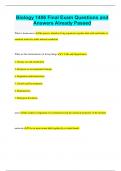
-
Biology 1406 Final Exam Questions and Answers Already Passed
- Exam (elaborations) • 115 pages • 2024
- Available in package deal
-
- $12.49
- + learn more
Biology 1406 Final Exam Questions and Answers Already Passed What is homeostasis the process whereby living organisms regulate their cells and bodies to maintain relatively stable internal conditions What are the characteristics of living things 1. Cells and Organization 2. Energy use and metabolism 3. Response to environmental changes 4. Regulation and homeostasis 5. Growth and Development 6. Reproduction 7. Biological Evolution atom the smallest component of an element havin...
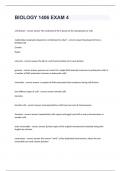
-
Biology 1406 Collin College -BIOLOGY 1406 EXAM 4 questions n answers
- Exam (elaborations) • 15 pages • 2024
-
Available in package deal
-
- $13.49
- + learn more
BIOLOGY 1406 EXAM 4cell division - correct answer The continuity of life is based on the reproduction of cells multicellular eukaryotes depend on cell division for what? - correct answer Development from a fertilized cell Growth Repair cell cycle - correct answer the life of a cell from formation to its own division genome - correct answer genome can consist of a single DNA molecule (common in prokaryotic cells) or a number of DNA molecules (common in eukaryotic cells) chromatin - ...
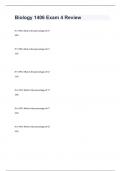
-
Biology 1406 Collin College -Biology 1406 Exam 4 Review with complete solutions
- Exam (elaborations) • 16 pages • 2024
-
Available in package deal
-
- $15.99
- + learn more
Biology 1406 Exam 4 ReviewIf T=39%, What is the percentage of A? 39% If T=39%, What is the percentage of C? 11% If T=39%, What is the percentage of G? 11% If A=19%, What is the percentage of T? 19% If A=19%, What is the percentage of C? 31% If A=19%, What is the percentage of G? 31%
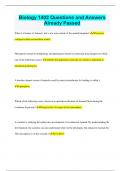
-
Biology 1402 Questions and Answers Already Passed
- Exam (elaborations) • 9 pages • 2024
-
Available in package deal
-
- $9.99
- + learn more
Biology 1402 Questions and Answers Already Passed What is a feature of Animals, but is not seen outside of the animal kingdom? They have collagen in their extracellular matrix. Phylogenies based on morphology and phylogenies based on molecular data disagree on which one of the following issues? whether the appearance and type of coelom is important in interpreting phylogeny A horshoe-shaped crown of tentacles used by many invertebrates for feeding is called a lophophore Which ...
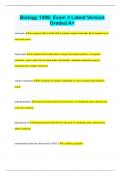
-
Biology 1406: Exam 3 Latest Version Graded A+
- Exam (elaborations) • 14 pages • 2024
-
- $10.49
- + learn more
autotrophs an organism able to build all the complex organic molecules that it requires as its own food source heterotroph an organism that cannot derive energy from photosynthesis or inorganic chemicals , and so must feed on other plants and animals, obtaining chemical energy by degrading their organic molecules cellular respiration the oxidation of organic compounds to extract energy from chemical bonds dehydrogenation chemical reaction that involves the loss of a hydrogen atom, electro...
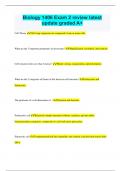
-
Biology 1406 Exam 2 review latest update graded A+
- Exam (elaborations) • 15 pages • 2024
-
- $10.49
- + learn more
Cell Theory All living organisms are composed of one or more cells. What are the 3 important parameters in microsopy? Magnification, resoultion, and contrast. Cell structure relies on what 4 factors? Matter, energy, organization, and information What are the 2 categories all forms of life based on cell structure? Prokaryotes and Eukaryotes. The proetome of a cell determines its ? Structure and function. Prokaryotic cell Reletively simple sturctures without a nucleus, put into either bacte...
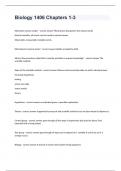
-
Biology 1406 Collin College -Biology 1406 Chapters 1-3 questions with answers
- Exam (elaborations) • 13 pages • 2024
-
Available in package deal
-
- $15.99
- + learn more
Biology 1406 Chapters 1-3What does science study? - correct answer Physical laws that govern the natural world. Natural causality- all events can be traced to natural causes Observable, measurable, testable events. What doesn't science study? - correct answer beliefs accepted by faith. What is the procedure called that is used by scientists to acquire knowledge? - correct answer The scientific method. Steps of the scientific method - correct answer Observe and accumulate data on wha...
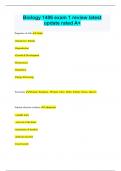
-
Biology 1406 exam 1 review latest update rated A+
- Exam (elaborations) • 13 pages • 2024
-
- $9.49
- + learn more
Properties of Life -Order -Sensitivity / Stimuli -Reproduction -Growth & Development -Homeostasis -Regulation -Energy Processing Taxonomy Domain- Kingdom - Phylum- Class- Order- Family- Genus- Species Natural selection evidence -adaptation -variable traits - survival of the fittest -mechanism of heredity -artificial selection -fossil records-comparative anatomy -molecular evidence Controlled Experiment an experimental groups is compared with a control group Technology apply scien...
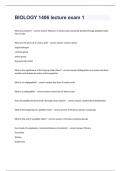
-
BIOLOGY 1406 lecture exam 1 questions with 100% correct answers
- Exam (elaborations) • 20 pages • 2024
- Available in package deal
-
- $17.99
- + learn more
BIOLOGY 1406 lecture exam 1 questions with 100% correct answersWhat are proteins? - correct answer Polymers of amino acids covalently bonded through peptide bonds into a chain What are the parts of an amino acid? - correct answer central carbon single hydrogen carboxyl group amino group R-group {side chain} What is the significance of the R-group {side chain}? - correct answer distinguishes one amino acid from another and dictates an amino acid's properties What is an oligopepti...
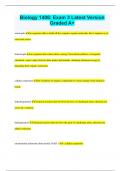
-
Biology 1406: Exam 3 Latest Version Graded A+
- Exam (elaborations) • 14 pages • 2024
- Available in package deal
-
- $9.99
- + learn more
Biology 1406: Exam 3 Latest Version Graded A+ autotrophs an organism able to build all the complex organic molecules that it requires as its own food source heterotroph an organism that cannot derive energy from photosynthesis or inorganic chemicals , and so must feed on other plants and animals, obtaining chemical energy by degrading their organic molecules cellular respiration the oxidation of organic compounds to extract energy from chemical bonds dehydrogenation chemical r...

That summary you just bought made someone very happy. Also get paid weekly? Sell your study resources on Stuvia! Discover all about earning on Stuvia


